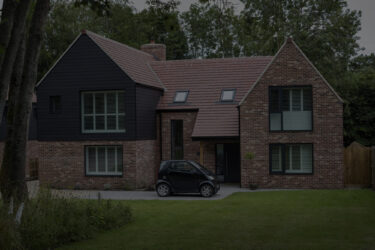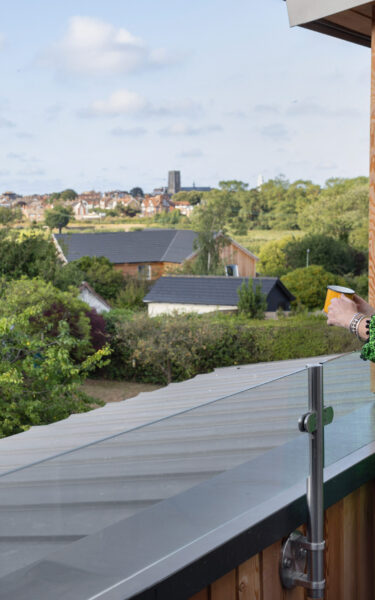Self build mortgages.
Get help with a self build and renovation mortgage.
Building your own home can be an incredible experience. If you’ve had a flash of inspiration and are looking to design your own home or want to embark on a renovation or conversion project, then our range of self build and renovation mortgages could be for you.
At Suffolk Building Society, we have flexible stage releases and a range of loyalty products for energy-efficient self build homes. We know how important your project is to you, which means we’re only a phone call away – whatever stage you’re at.


Suffolk Building Society
Why self build with us?
Flexible stage release
Unlike some lenders, we won’t set pre-defined milestones to release more of the loan. If you can evidence progress on the build, we’ll work with a valuer to calculate the next stage release sum, which can be helpful if a specific task has cost a little more than you first thought.
We appreciate you’ll want some certainty to help you plan. Our FAQ below, ‘When can I access self build mortgage stage payments‘, gives more of a steer on milestones and the process of releasing funds.
A wide range of building types
Available for several projects and build types, including new projects from scratch; conversions; renovations; knock down and rebuilds; and mid or partially built projects.
Special loyalty products
Our self builders can switch from a self build mortgage product to one of our residential products on completion of their build, without paying an Early Redemption Charge (ERC). This doesn’t depend on the Energy Performance Certificate (EPC) of your finished property.
EPC-related loyalty product
If your finished project achieves an EPC rating of A or B you’ll be able to access a reduced rate loyalty product. A little ‘thank you’ from us for your efforts towards reducing your energy consumption.
GET STARTED
How a self build and renovation mortgage works.
You’ve got a great spot of land with some planning permission, and you can’t wait to get building. Here’s how we can help you to get started and release your inner architect.
- Complete our mortgage enquiry form. We’ll then get in touch with you about the finer details – such as project costs, the value of the land, and the planning permission in place.
- Once you’ve formally applied for your mortgage, paid fees and we’ve given you a ‘Decision in Principle’; we’ll send a valuer to check the land and the plans. We’ll always try our utmost to use the same valuer throughout the build.
- The application will then be processed, and once ready, and offer will be issued.
- If you accept the offer and the legal work has been carried out, we’ll start working on the first stage payment!
- Based on the agreed value, you can then take your first draw down.
- We then release funds as part of our ‘flexible stage release’ process. Unlike some other lenders, we don’t require you to hit certain milestones in the build before the next stage release. So long as you can evidence progress against the project plan, we’ll send the valuer to estimate the value of the land and the build so far, which we’ll use to calculate the next stage release sum.
When your dream build is complete, we’ll speak to you about arranging your switch to a residential loyalty product.
WHAT HAPPENS NEXT
Loyalty products.
Our self builders can switch from a self build mortgage product to one of our residential products on completion of their build, without paying an Early Redemption Charge (ERC).
And if your new home has an Energy Performance Certificate (EPC) rating of A or B you’ll have access to a lower interest rate loyalty product, again without paying an ERC.
decision in principle
Get a decision in principle.
A decision in principle for a mortgage will give you an idea of whether we can help you. It’ll also give you an idea of how much you could borrow.
You can get started by completing the form on the link below. It’ll take around 10 minutes to complete.
While we can’t give you an instant online decision, our expert team members will review your request individually to see if we can help.
Here to help
Find a self build mortgage.
Below you can view our self build mortgage products to see what’s currently on offer. A self build mortgage with Suffolk Building Society can include financing new build projects, renovations, conversions and even ‘knock down and rebuilds’.
Found a self build mortgage product? Use our mortgage repayment calculator to get an idea of how much it’ll cost, or for general details about mortgages visit our mortgage information page.
Mortgage Name
Rate
Initial Rate
APRC
Rate Term
Max loan amount
Max LTV
Full Details
Self Build & Renovation Large Loan 2 Year Discount Rate – for purchase or remortgage up to 70% LTV
Variable
Product ID: Purchase: 46136 Remortgage: 46137
Variable
Initial Rate
6.05% (SVR minus 2.09%)
APRC
8.0%
Rate Term
2 year
Max loan amount
£2m
Max LTV
70%
Eco Self Build & Renovation 2 Year Discount Rate – for purchase or remortgage up to 80% LTV
Variable
Product ID: Purchase: 46138 Remortgage: 46139
Variable
Initial Rate
5.85% (SVR minus 2.29%)
APRC
7.6%
Rate Term
2 year
Max loan amount
£1m
Max LTV
80%
Self Build & Renovation 2 Year Discount Rate – for purchase or remortgage up to 80% LTV
Variable
Product ID: Purchase: 46134 Remortgage: 46135
Variable
Initial Rate
5.95% (SVR minus 2.19%)
APRC
7.7%
Rate Term
2 year
Max loan amount
£1m
Max LTV
80%
Additional Borrowing (Self Build) 2 Year Discount – up to 80% LTV
Variable
Product ID: 78039
Variable
Initial Rate
6.99% (SVR minus 1.15%)
APRC
7.9%
Rate Term
2 year
Max loan amount
£500,000
Max LTV
80%
CASE STUDY
How we helped Jules and Nigel to build their dream home.
When Jules and Nigel bought a Suffolk cottage, they had plans for a significant extension – to help accommodate their dogs and miniature pet donkeys!
- The couple opted to incorporate eco-friendly features such as an air source heat pump and natural cladding.
- They were looking for a 13-year term to take them into retirement, raising £300,000. Their existing property was worth £385,000, with an expected £1.2m value on completion of the work.
- As part of the work, they were also able to include some unique features such as a picture window in the kitchen to allow the donkeys to walk up to the house, and a grand feature staircase which was a focus of their vast living area.
At Suffolk Building Society, we endeavour to understand your vision and work with your, your architect and the valuer to make it a reality.
FAQs
Self build mortgages – your questions answered.
A self build mortgage is a home loan taken out to build a property, not just for brand new projects but also can include partially built projects, conversion, renovations and knock down and rebuilds.
Self build mortgages are for when funds are needed for construction and renovation purposes, whilst a residential mortgage is for purchasing a property which is already built and habitable. Additionally, with a self build mortgage the money is released in stages as the build progresses, rather than in a lump sum.
The advantage to having the money released in stages is that self builders will only be paying interest on the money borrowed as they need it. The interest saved can be considerable, and is normally far higher than the £100 release fee.
Self build mortgage lenders will have their own requirements around when you can release stage payments. At Suffolk Building Society we operate flexible stage payments. Some of these milestones can include buying the land, laying foundations, making the building wind and watertight, buying fixtures and fittings, and the final stage is always retained until the build is complete. We recommend you liaise with your project manager to ensure the funds are requested at the right intervals to maintain cash flow. At each stage release we’ll need to instruct a valuer to inspect the property, and charge a stage release fee totalling £100.
Self build mortgage lenders either release funds in arrears or in advance. For new purchases, Suffolk Building Society releases funds in stages after the work has been carried out. Once you’ve purchased your property, or land, you’ll need enough of your own funds to start the build. Once the agreed work has been completed, you’ll be able to obtain your next stage release, allowing you to carry on with the build. This continues until your home is finally finished.
Advance stage payments are the opposite, where you get the funds before carrying out the work. Whilst this might seem appealing , in that you get the money to carry out the work upfront, this is riskier for the lender as the security for the loan doesn’t actually exist yet. That’s why advance stage payment mortgages are less common, and those that are available are typically offered at a higher rate than those where money is released in arrears.
For self build remortgages, it can depend on your circumstances whether you would be receiving funds in advance or arrears. Please speak with us to explore the options available.
You’ll need to check this with your self build mortgage lender. Our self build mortgages are only for personal use, so borrowers must live in the property themselves once it has been completed.
Once your self build project is complete, you’ll need to provide your lender with three pieces of information: a Completion Certificate, Standard Buildings Insurance Schedule, and Copy of the Warranty/Architect Certificate. At this point the last stage of funds will be released for your final bills to be paid. Subject to the terms of your mortgage you should be able to remortgage onto a standard residential product. At Suffolk Building Society we offer loyalty products for our existing borrowers.
It’s down to self build mortgage lenders to assess which methods of construction they’re happy to accept. At Suffolk Building Society we can consider a variety of build types, including those using modern methods of construction (MMC) and ones primarily built offsite. In some instances, we will require these schemes to be accredited through BOPAS. This gives assurance that properties are sufficiently durable and readily saleable for a minimum of 60 years.
There are some clear benefits to building your own home, however it’s no small task, and there are both advantages and challenges that you need to be aware of from the outset.
Perhaps the most obvious advantage of building your own home is the ability to make it completely bespoke. You could choose to integrate energy-efficient systems, which could provide savings in the long term and be more effective than retro-fitting. Additionally, self builders may be able to claim back VAT on labour and many material costs. It’s best to check this fully as rules and regulations can change.
However, some of the frustrations can come about from an early stage, starting with the lengthy and sometimes complex issue of gaining planning permission. There’s also your self build mortgage application which is more complex than a residential mortgage and will likely take longer to be processed. Speaking of mortgages, interest rates are usually higher than a residential mortgage as there is greater risk to the lender and there are usually conditions placed upon self build mortgages by lenders to protect their risk.
As with any financial decision you should take time to carefully consider your options.
Before you apply for a self build mortgage most lenders will require you to have certain things in place. This includes finding a suitable plot of land, obtaining planning permission and having detailed plans of the property drawn up along with a realistic projection of costs. Unless you already own the land, you will also need to have a deposit saved up and some funds put aside.
Enquiries
We have conversations, not algorithms.
Our decisions are made by experts, not computers. We need to calculate the financials, but we understand there’s more behind a mortgage than the numbers on a page. We can’t promise to lend to everyone and anyone, but we’ll consider most applications on an individual basis.
Ready to go? We’d love to hear from you. Get in touch with our friendly and knowledgeable team.
Prefer to talk?
Call 0330 123 0723
Contact us
From Our Blog
Self build news.
Our blog contains the latest goings-on and updates across the Society, so here’s where you can check out our latest self build news.
Or, if you want to see more than just self build, take a look at all of our blogs.

The Self Build Land Grab

Self Build Research: a Third of People are Considering Self Build.

A Self Build Project in Ely

How to Know if a Plot of Land is Suitable for a Self Build Project

Self Builders = Wealth Builders

Finding Land for Self Build






